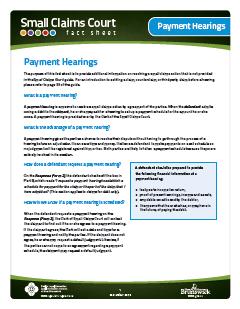Going to Court
Small Claims Court: Payment Hearings
The purpose of this fact sheet is to provide additional information on resolving a small claims action that is not provided in the Small Claims Court guide. For an introduction to settling a claim, counterclaim, or third party claim before a hearing, please refer to page 33 of the guide.
What is a payment hearing?
A payment hearing is a means to resolve a small claims action by agreement of the parties. When the defendant admits owing a debt to the claimant, he or she may ask for a hearing to set up a payment schedule for the amount he or she owes. A payment hearing is presided over by the Clerk of the Small Claims Court.
What is the advantage of a payment hearing?
A payment hearing gives the parties a chance to resolve their dispute without having to go through the process of a hearing before an adjudicator. It can save time and money. It allows a defendant to make payments on a set schedule so no judgment will be registered against him or her. Both parties are likely to follow a payment schedule because they were actively involved in its creation.
How does a defendant request a payment hearing?
On the Response (Form 2), the defendant checks off the box in Part B, which reads “I request a payment hearing to establish a schedule for payment for the claim or the part of the claim that I have admitted.” (This section applies to claims for debt only).
A defendant should be prepared to provide the following financial information at a payment hearing:
- last year’s income tax return,
- proof of present earnings, income and assets,
- any debts owed to and by the debtor,
- the means that he or she has, or may have in the future, of paying the debt.
How will we know if a payment hearing is scheduled?
When the defendant requests a payment hearing on the Response (Form 2), the Clerk of Small Claims Court will contact the claimant to find out if he or she agrees to a payment hearing. If the claimant agrees, the Clerk will set a date and time for a payment hearing and notify the parties. If the claimant does not agree, he or she may request a default judgment. Likewise, if the parties cannot come to an agreement regarding a payment schedule, the claimant may request a default judgment.
What happens if the parties reach an agreement at the payment hearing?
Where the parties agree on a payment schedule, they can sign a Payment Agreement (Form 10) and the Clerk can file it with the court.
What happens if the defendant misses a payment?
The Small Claims Court is not responsible for enforcing payment schedules. If a payment is missed, it is up to the claimant to take action. He or she may request a default judgment for the balance owing without further notice to the defendant. If a judgment is made, the defendant must pay the full debt immediately.
March 2014
ISBN: 978-1-4605-0397-3
Disclaimer: Please note that our website contains general information about the law. This is not a complete statement of the law on particular topics. We try to update our publications often, but laws change frequently so it is important for you to check to make sure the information is up to date. The information in our publications is not a substitute for legal advice. To receive legal advice about your specific situation, you need to speak to a lawyer.



